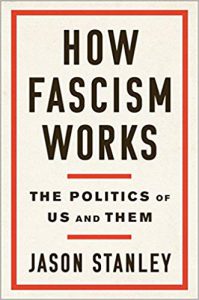Books
What Defenders and Critics Get Wrong about the 'Marketplace of Ideas'
The motif of the marketplace of ideas, Stanley argues, only works with descriptive speech.


In his book How Fascism Works, Yale philosophy professor Jason Stanley exposes the weakness in the most common argument for free speech. According to this argument, which can be traced back to liberal thinkers such as John Stuart Mill, free speech leads to a “marketplace of ideas” in which the truth prevails and falsehoods are widely rejected.
Stanley argues that the recent proliferation of conspiracy theories and dog-whistles refute the premise that “reason always wins out in the public square of liberal democracy.” He is primarily concerned about conspiracy theories, such as the Protocols of the Elders of Zion, which serve to spread fascistic worldviews. This type of speech, he concludes, cannot be effectively countered through a free exchange of ideas.
The motif of the marketplace of ideas, Stanley argues, only works with descriptive speech. Descriptive speech occurs when words are communicated precisely in their logical or semantic sense. The paradigmatic example is of scientists engaged in an exchange where words have precise and agreed meanings. Non-descriptive speech, by contrast, is exemplified by rhetoric, such as that employed by a demagogue evangelizing before a crowd. In the latter, “language is not used simply, or even chiefly, to convey information but to elicit emotion.”
A common characteristic of non-descriptive speech is the use of inverted concepts—concepts that redefine words in order to destroy their original and intended meanings. For example, Hitler redefined democracy to mean the “free choice of the Leader, along with his obligation to assume entire responsibility for all he does and causes to be done.” This helped to justify authoritarianism by using the language of representative government. This perversion of speech, Stanley argues, is insidious and profoundly corrosive to public discourse.
According to Stanley, only conversations which use descriptive speech end up being productive of knowledge. He believes conspiracists and fascists regularly employ non-descriptive speech and thereby subvert the marketplace of ideas. Stanley goes on to condemn channels like Russia Today (RT.com) which routinely smudge the difference between the two sorts of speech by hosting conspiracy theorists and treating them as though they were scientists. Stanley concludes his argument with the ominous claim that, “Attempting to counter such rhetoric with reason is akin to using a pamphlet against a pistol.” Although Stanley never explicitly advocates censorship, the implications of his argument are clear.
Stanley’s criticisms follow from an error frequently made by defenders of free speech—they tend to equate free expression as a right with practices that promote productive dialogue. The confusion occurs because the two are linked—freedom of speech does indeed allow productive conversations to occur—but should not be conflated.
Freedom of speech and the right to associate freely both secure for people the ability to write, speak, and establish institutions. These institutions can then agree upon guidelines concerning requirements for productive conversations. Various institutions may set up different policies and restrictions depending on their goals.
Stanley is correct that including certain viewpoints in specific forums can elevate arbitrary claims by treating them as reputable, thereby undermining people’s ability to think clearly about issues. For instance, no reputable scientific journal should give a platform to young Earth creationists, nor should university history departments be agnostic about whether the Holocaust is a hoax.

However, it does not follow that a government censor could or should ensure the quality of public discourse as an editor curates the content of a scientific journal. A prudently censored environment will not facilitate the diffusion of knowledge. Knowing requires independent judgment. When evaluating any issue, each person has to make judgments not just about what evidence to consider, but also about what to count as evidence. In censored environments, access to relevant information will most likely be excluded. And even if the censors don’t exclude any relevant information, one cannot be sure of this because access to those materials is prohibited.
Censoring false information and malicious opinions does nothing to show why a given view is incorrect or convince anyone of the truth. The primary victims of censorship are therefore conscientious truth seekers denied the opportunity to exercise their own judgment.
Prohibiting access to fanatical and evil ideas encroaches on any honest person’s ability to judge for themselves whether or not the ideas are evil and why. I came to understand Nazism and Islamism by reading their primary writings, and by reading books and essays by those who have done likewise. Had access to these writings been restricted by the decree of an authority, my conclusions about these mass movements and their ideologies would not be justified. This obviously does not mean that anyone has an obligation to promote these views—all that is required is that a government not censor them so that they are available to study.
This view is consistent with Stanley’s observation that certain forums (such as scientific journals) need to restrict the points of view to which they are prepared to provide a platform. An array of institutions and forums, each with their own standards, some more restrictive than others, is a consequence of intellectual freedom, not a barrier to it.
Contrary to the assertions made by some defenders of free speech, its value does not depend upon a consequential triumph for the truth in the “marketplace of ideas.” This “marketplace” cannot automatically guarantee such an outcome, and nor can any other social system. Rather, the right to free speech secures an environment in which everyone is allowed to consider various opinions and to inspect the supporting evidence. Freedom of speech protects our ability to engage in the type of activity required to know the truth about any topic of interest, but it makes no guarantees about the outcome.
It is also incorrect to think that rational advocates are powerless against the sort of speech that worries Stanley. Take the issue of states’ rights, which was used to defend Jim Crow laws. Stanley correctly identifies this as an example of racists using inverted concepts to promote their worldview—the language of “rights” was employed to justify the ongoing oppression of those the concept of rights was intended to protect. But Stanley neglects to mention that the Civil Rights movement (arguably the greatest triumph of free speech in American history) overturned this perversion.
Indeed, Stanley’s argument never mentions any of the historical triumphs of true ideas over false ones. And while the “marketplace of ideas” does not guarantee an acceptance of truth, it is the most useful and effective tool available to us. Even the most optimistic thinkers centuries ago could not have imagined the breadth of knowledge available to those in countries with little to no regulation of speech. But a valid defence of free speech requires us to recognize the importance of unencumbered thought and honest dialogue if we are to discover what is true and what is not.






